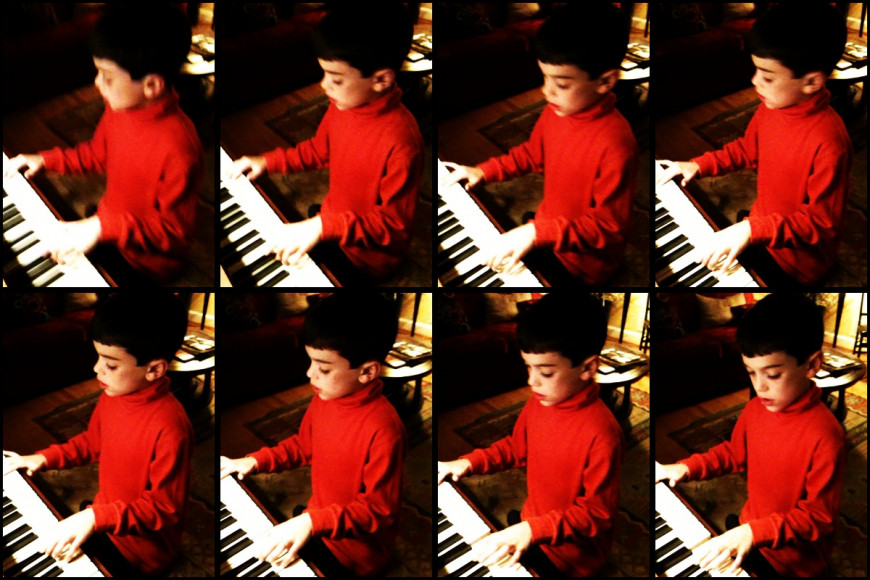When Should My Child Start Learning Music?

Music lessons benefit kids greatly - be it in terms of academics, social development, fostering a good work ethic, or just for the fun of it. There’s no reason to eschew music lessons as you age - they also benefit adults, but if you’re a parent, the question isn’t whether your kids will benefit from music lessons, it’s when should my child start music lessons?
The answer varies greatly depending on your child’s development and interests. If you want your child to play the upright bass, you may have to hold off on lessons despite your three-year-old’s eagerness to follow in your footsteps. But, if your daughter can’t stop tapping on everything in sight, there’s no reason you can’t start her off with some children’s drum lessons. Choosing which instrument to learn first is a key step in helping children develop a love of music. A great way to get started down this road is to expose your child to a great variety of music. PBS Parents wrote an interesting article called “What Music Should My Child Listen To?” that can help in that regard.
In order to give you a quick answer, we’ve broken down age ranges with a few examples of appropriate instruments. These are merely suggestions, however. You’re the parent, so you know your child best, and it’s never too late.
Under 6
At this point, formal lessons may be beyond some children. That doesn’t mean you should mute your child’s musical exposure and education, however. If you play a particular instrument, it’s great to play at home so your child can see you having fun playing music. It doesn’t matter whether it’s the drums, piano, tuba, or violin - just play and watch your child’s reaction to determine the next step. If he or she is a bit ahead of the curve developmentally or physically, you may want to consider trying jumping to the next age group.
Hand drums are also an excellent option for younger children. Whether it’s the bongo, conga, or djembe with experienced teachers like Todd Isler or Tareq Rantisi or perhaps tabla lessons with Aditya Kalyanpur (shown in the video below), developing rhythm will help throughout your child’s life.
Singing with your child is great in this stage - think of it the same way you would reading before bed. As soon as we develop the ability to mimic the noises we hear, we use our voices to entertain ourselves. Singing with your child develops a deep bond and awakens the child’s desire to sing as well - which can pay off with confidence throughout one’s life.
As voice instructor Josh Turner points out, “learning to sing is much deeper than just singing, it is also learning confidence, how to speak up for yourself in a powerful way, how to develop more of an identity within yourself, and oftentimes, how to break through emotional blocks that we have all put on ourselves at a young age.”
Other instruments experts say can be played before six are the violin, piano, xylophone, and recorder. Some recommend starting on these instruments as early as four or five years old.
From 6 to 12
In this stage, when a child is starting to grow enough size to handle an instrument and can focus for 15 or 30 minutes at a time, many instruments become real possibilities.
Starting children with music lessons between the ages of six and eight years old can produce a lifetime of positive development. A study by McGill University showed powerful evidence that from six to eight children enter a “sensitive period” where motor skills and brain structure are heavily - and positively - impacted by music lessons.
"Learning to play an instrument requires coordination between hands and with visual or auditory stimuli," said Virginia Penhune, a Concordia University psychology professor who helped run the McGill study. "Practicing an instrument before age seven likely boosts the normal maturation of connections between motor and sensory regions of the brain, creating a framework upon which ongoing training can build."
Learning piano or keyboard is a fantastic option during this important age. A full-sized guitar or bass guitar probably won’t work for most children in this range, but there are plenty of smaller options to offer your son or daughter. Junior guitars can be excellent choices for children in this bracket, but the best bet may be children’s ukulele lessons.
The uke has only four strings and comes in various manageable sizes. There are four main ukulele models, and the smallest standard option is the 21” soprano ukulele. Khabu Young, a ukulele and guitar master teacher, suggests waiting until about seven years old before starting formal lessons.
“When working with children, I've had the best success teaching ukulele and guitar starting around seven years of age,” he says. “The requisite manual dexterity develops pretty consistently around that time. Much younger than that often produces frustration which could potentially discourage the child from continuing music lessons of any kind.”
Singing lessons are ideal for this time frame. Lalana Martin, who has taught Grammy-winners and worked with Barry White and Patti LaBelle, accepts students eight years old and up.
From 13 On Up
Once your child hits the teen years, any instrument ought to be on the table. Physical size or dexterity are no longer an issue, and motivation may be higher for those looking to play in a band or the high school orchestra. Have at it!
One important note: Great musicians aren’t always great teachers. Teaching and playing are different skills, especially when it comes to working with children. We recommend focusing your teacher search on a skilled educator with experience working with youngsters.
Do you agree or disagree with our age suggestions? Sign in to comment below or tweet us @lessonface.
Click here to book an online lesson or here to learn more about how Lessonface works. You can also check out our blog here to read more about Lessonface and our teachers.




